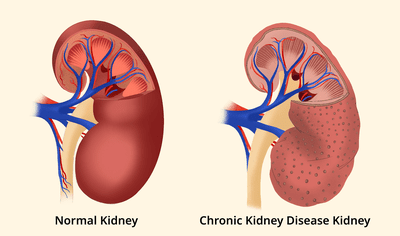Chronic Kidney Disease (CKD) is a silent but serious progressive health condition that affects millions worldwide, often going undetected until significant damage has occurred. Early detection is critical for slowing disease progression, preventing complications, and improving quality of life. With over 37 million Americans living with CKD, according to a data from the Centers for Disease Control and Prevention (CDC), understanding the importance of early detection can make a life-changing difference.
What Is Chronic Kidney Disease?
CKD is a long-term condition where the kidneys gradually lose their ability to filter waste and excess fluids from the blood. The kidneys play a vital role in maintaining overall health by regulating blood pressure, producing red blood cells, and balancing electrolytes. According to the National Institute of Diabetes and Digestive and Kidney Diseases (NIDDK), CKD is classified into five stages based on the glomerular filtration rate (GFR), with stage 1 being mild and stage 5 indicating kidney failure.
“CKD is often called a ‘silent disease’ because it can progress without noticeable symptoms until advanced stages,” says Dr. Joseph Vassalotti of the National Kidney Foundation. What makes CKD particularly dangerous is that 90% of people with early-stage kidney disease don’t know they have it. Early detection through routine screening is essential, as CKD increases the risk of heart disease, kidney failure, and premature death.
Causes and Risk Factors of CKD
CKD develops when the kidneys are damaged over time by various factors. The Mayo Clinic identifies common causes:
- Diabetes: The leading cause, accounting for 44% of CKD cases, per the CDC. High blood sugar damages kidney blood vessels.
- High Blood Pressure: The second leading cause, damaging kidney arteries over time.
- Glomerulonephritis: Inflammation of the kidney’s filtering units.
- Polycystic Kidney Disease (PKD): A genetic disorder causing cysts in the kidneys.
- Recurrent Kidney Infections or Obstructions: Such as kidney stones or enlarged prostate.
- Autoimmune Diseases: Lupus and other conditions can affect kidney function.
Cirrhosis: Liver Damage Explained and What You Should Do
Risk factors include obesity, smoking, family history of kidney disease, older age, and certain ethnicities (African American, Hispanic, Native American).
Symptoms of Chronic Kidney Disease
CKD often progresses silently in its early stages, with symptoms appearing only in advanced stages (3-5). Below are the common signs of Chronic Kidney Disease:
- Fatigue: Due to anemia from reduced red blood cell production.
- Swelling (Edema): In the legs, ankles, or feet from fluid retention.
- Frequent Urination or Reduced Urine Output: Changes in urination patterns.
- Foamy Urine: Indicating protein in the urine (proteinuria).
- High Blood Pressure: Difficult to control, worsening kidney damage.
- Itchy Skin: From waste buildup in the blood.
- Shortness of Breath: Due to fluid in the lungs.
- Loss of Appetite or Metallic Taste: Caused by toxin accumulation.
Many patients don’t realize they have CKD until it’s advanced, which is why screening is so important.
Why Early Detection Matters
Early detection of CKD allows for interventions that can slow progression and reduce complications. The CDC reports that early treatment can prevent or delay kidney failure, reducing the need for dialysis or transplantation. Benefits of early detection include:
- Preserving Kidney Function: Medications and lifestyle changes can slow damage.
- Preventing Complications: Reduces risks of heart disease, stroke, and anemia.
- Improving Quality of Life: Manages symptoms before they become severe.
The American Kidney Fund emphasizes that routine screening is critical for high-risk groups, such as those with diabetes or hypertension.
What Triggers Asthma Attacks and How to Avoid Them
Diagnostic Tools for CKD
Diagnosing CKD involves assessing kidney function and identifying underlying causes. The key diagnostic methods for CKD are:
- Blood Tests: Measure creatinine levels to calculate estimated GFR (eGFR), indicating kidney function. Normal eGFR is above 90 mL/min/1.73 m².
- Urine Tests: Detect albumin (protein) in urine, an early sign of kidney damage.
- Imaging Tests: Ultrasound or CT scans assess kidney size and structure.
- Kidney Biopsy: Examines tissue to identify specific causes like glomerulonephritis.
Managing Chronic Kidney Disease
While CKD is not curable, early intervention can slow progression and manage symptoms. Below are evidence-based strategies from the Mayo Clinic, NIDDK, and American Kidney Fund.
1. Control Underlying Conditions
Managing diabetes and hypertension is critical:
- Blood Sugar Control: Keep HbA1c below 7% for diabetes, per the American Diabetes Association.
- Blood Pressure Management: Maintain BP below 130/80 mmHg using medications like ACE inhibitors or ARBs, which also protect kidneys, per the American Heart Association.
2. Medications
Medications address symptoms and complications:
- ACE Inhibitors/ARBs: Reduce proteinuria and slow kidney damage.
- Diuretics: Manage fluid retention and edema.
- Erythropoietin: Treats anemia by boosting red blood cell production.
- Phosphate Binders: Control phosphorus levels in advanced CKD.
Consult a nephrologist for personalized treatment, per the National Kidney Foundation.
3. Dietary Changes
A kidney-friendly diet supports health:
- Low Sodium: Reduces fluid retention and blood pressure, per the NIDDK.
- Moderate Protein: Limits waste buildup while preserving muscle mass.
- Limit Phosphorus and Potassium: Prevents complications in advanced stages.
- Heart-Healthy Foods: Focus on fruits, vegetables, and whole grains.
Work with a dietitian for a tailored plan, advises the American Kidney Fund.
4. Lifestyle Modifications
Healthy habits slow CKD progression:
- Exercise: 150 minutes of moderate activity weekly improves cardiovascular health, per the CDC.
- Quit Smoking: Smoking worsens kidney damage, says the National Kidney Foundation.
- Maintain Healthy Weight: Reduces strain on kidneys, especially for NAFLD-related CKD.
- Stay Hydrated: Supports kidney function unless fluid restrictions are advised.
Recommended: Kidney Stones: Treatment, Prevention, Foods to Avoid, and What to Expect
5. Monitor and Prevent Complications
Regular monitoring prevents complications like cardiovascular disease, which affects 65% of CKD patients. Strategies include:
- Regular blood and urine tests to track eGFR and albumin.
- Managing cholesterol with statins to reduce heart risk.
- Vaccinations (flu, pneumococcal, hepatitis B) to prevent infections.
6. Dialysis and Transplantation
For stage 5 CKD (kidney failure), dialysis or transplantation may be necessary:
- Dialysis: Filters blood artificially (hemodialysis or peritoneal dialysis).
- Kidney Transplant: Replaces failed kidneys with a donor organ, per the United Network for Organ Sharing (UNOS).
7. Emotional and Social Support
CKD can impact mental health. The American Kidney Fund suggests:
- Joining support groups for peer connection.
- Seeking counseling for anxiety or depression.
- Engaging family and friends for support.
Preventing Chronic Kidney Disease
Preventing CKD involves reducing risk factors:
- Manage diabetes and hypertension through regular check-ups.
- Avoid overuse of NSAIDs (e.g., ibuprofen), which can harm kidneys, per the Mayo Clinic.
- Limit alcohol and avoid smoking.
- Maintain a healthy weight and active lifestyle.
See Also: Living with Asthma: Tips for Better Breathing
When to Seek Medical Attention
Seek immediate care for:
- Severe swelling or shortness of breath.
- Persistent fatigue, nausea, or confusion.
- Blood in urine or significant changes in urination.
The National Kidney Foundation recommends regular nephrologist visits for high-risk individuals or those diagnosed with CKD.
Conclusion
Chronic Kidney Disease is a serious but manageable condition when detected early. Routine screening, lifestyle changes, and medical interventions can slow progression and improve quality of life. Consult a healthcare provider for personalized care, and prioritize early detection to live well with CKD.
What Causes Kidney Stones? Symptoms and Risks
COPD: Breathing Better with Chronic Obstructive Pulmonary Disease


